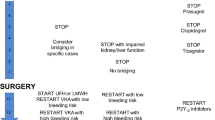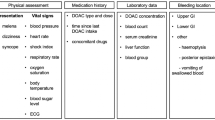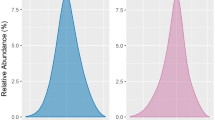Abstract
Bleeding is a serious complication associated with the use of both conventional and new anticoagulants in the prevention and treatment of thromboembolic complications. Although bleeding can often be managed with general measures, rapid reversal of the anticoagulant effect through the use of specific antidotes or other interventions is desirable in many cases.
Similar content being viewed by others
References
Donadini MP, Ageno W, Douketis JD. Management of bleeding in patients receiving conventional or new anticoagulants: a practical and case-based approach. Drugs. 2012;72(15):1965–75.
Schulman S, Kearon C. Definition of major bleeding in clinical investigations of antihemostatic medicinal products in non-surgical patients. J Thromb Haemost. 2005;3:692–4.
Ost D, Tepper J, Mihara H, et al. Duration of anticoagulation following venous thromboembolism: a meta-analysis. JAMA. 2005;294:76–715.
Palareti G, Leali N, Coccheri S, et al. Bleeding complication of anticoagulant treatment: an inception-cohort, prospective collaborative study (ISCOAT). Lancet. 1996;348:423–8.
Schulman S, Beyth RJ, Kearon C, et al. Hemorrhagic complications of anticoagulant and thrombolytic treatment: American College of Chest Physicians evidence-based clinical practice guidelines (8th edition). Chest. 2008;133(6 Suppl):257S–98S.
Garcia DA, Baglin TP, Weitz JI, et al. Parenteral anticoagulants: antithrombotic therapy and prevention of thrombosis, 9th edition: American College of Chest Physicians evidence-based clinical practice guidelines. Chest. 2012;141(2 Suppl):e24S–43S.
Bianchini EP, Fazavana J, Picard V, et al. Development of a recombinant antithrombin variant as a potent antidote to fondaparinux and other heparin derivatives. Blood. 2011;117:2054–60.
Desmurs-Clavel H, Huchon C, Chatard B, et al. Reversal of the inhibitory effect of fondaparinux on thrombin generation by rFVIIa, aPCC and PCC. Thromb Res. 2009;123:796–8.
Bijsterveld NR, Vink R, van Aken BE, et al. Recombinant factor VIIa reverses the anticoagulant effect of the long-acting pentasaccharide idraparinux in healthy volunteers. Br J Haematol. 2004;124:653–8.
Bijsterveld NR, Moons AH, Boekholdt SM, et al. Ability of recombinant factor VIIa to reverse the anticoagulant effect of the pentasaccharide fondaparinux in healthy volunteers. Circulation. 2002;106:2550–4.
Connolly SJ, Ezekowitz MD, Yusuf S, et al. Dabigatran versus warfarin in patients with atrial fibrillation. N Engl J Med. 2009;361:1139–51.
Patel MR, Mahaffey KW, Garg J, et al. Rivaroxaban versus warfarin in nonvalvular atrial fibrillation. N Engl J Med. 2011;365:883–91.
Kaatz S, Kouides PA, Garcia DA, et al. Guidance on the emergent reversal of oral thrombin and factor Xa inhibitors. Am J Hematol. 2012;97(Suppl 1):S141–5.
Eerenberg ES, Kamphuisen PW, Sijpkens MK, et al. Reversal of rivaroxaban and dabigatran by prothrombin complex concentrate: a randomized, placebo-controlled, crossover study in healthy subjects. Circulation. 2011;124:1573–9.
Marlu R, Hodaj E, Paris A, et al. Effect of non-specific reversal agents on anticoagulant activity of dabigatran and rivaroxaban: a randomised crossover ex vivo study in healthy volunteers. Thromb Haemost. 2012;108(2):217–24.
Stangier J, Rathgen K, Stahle H, et al. Influence of renal impairment on the pharmacokinetics and pharmacodynamics of oral dabigatran etexilate: an open-label, parallel-group, single-centre study. Clin Pharmacokinet. 2010;49:259–68.
Disclosure
This review was adapted from Drugs 2012;72(15):1965–75 [1]. The preparation of these articles was not supported by any external funding.
Author information
Authors and Affiliations
Consortia
Rights and permissions
About this article
Cite this article
Adis Medical Writers. Treat anticoagulant-associated bleeding on the basis of bleeding severity and the availability of reversal agents. Drugs Ther Perspect 29, 77–81 (2013). https://doi.org/10.1007/s40267-012-0010-z
Published:
Issue Date:
DOI: https://doi.org/10.1007/s40267-012-0010-z




